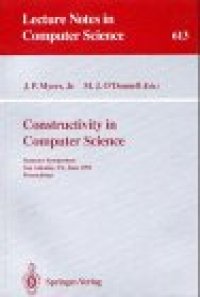
Ebook: Constructivity in Computer Science: Summer Symposium San Antonio, TX, June 19–22, 1991 Proceeding
- Genre: Education // International Conferences and Symposiums
- Tags: Mathematical Logic and Formal Languages, Artificial Intelligence (incl. Robotics), Logics and Meanings of Programs, Programming Languages Compilers Interpreters, Mathematical Logic and Foundations
- Series: Lecture Notes in Computer Science 613
- Year: 1992
- Publisher: Springer-Verlag Berlin Heidelberg
- Edition: 1
- Language: English
- djvu
Mathematicians have long recognized the distinction between an argument showing that an interesting object exists and a procedure for actually constructing the object. Computer science adds a new dimension of interest in constructivity, since a computer program is a formal description of a constructive procedure that can be executed automatically. It has beenover a decade since a conference was devoted to constructivity, and never before has one been held specifically relating computer science to constructivity. Thus, this proceedings volume is the most concentrated offering ever produced of the diverse ways in which constructivity and computer science are related. The papers cover semantics and type theory, logic and theorem proving, real and complex analysis, topology and combinatorics, nonconstructive graph-theoretical techniques, and curriculum and pedagogic issues. The book offers a concentrated view of the many ways in which constructivity has assumed importance in computer science, and contains results available nowhere else.
Mathematicians have long recognized the distinction between an argument showing that an interesting object exists and a procedure for actually constructing the object. Computer science adds a new dimension of interest in constructivity, since a computer program is a formal description of a constructive procedure that can be executed automatically. It has beenover a decade since a conference was devoted to constructivity, and never before has one been held specifically relating computer science to constructivity. Thus, this proceedings volume is the most concentrated offering ever produced of the diverse ways in which constructivity and computer science are related. The papers cover semantics and type theory, logic and theorem proving, real and complex analysis, topology and combinatorics, nonconstructive graph-theoretical techniques, and curriculum and pedagogic issues. The book offers a concentrated view of the many ways in which constructivity has assumed importance in computer science, and contains results available nowhere else.